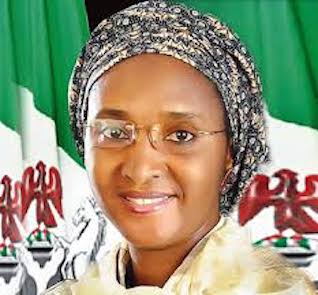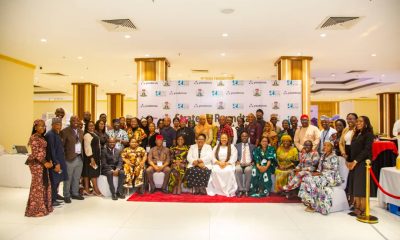Business News
VREG 1st Phase Begins at NCS Kirikiri Light Terminal – Finance Minister

By Tony Obiechina, Abuja
The Minister of Finance, Budget and National Planning, Mrs. Zainab Ahmed, has disclosed that the pilot phase of VREG has commenced at the Nigeria Customs Service Kirikiri Light Terminal.
The Minister disclosed this in a keynote address at the nation-wide seminar on the VREG in Abuja, which she said was meant to enlightened the public on vehicle transfer and processing.
According to her, VREG is powered by interconnected interactions of key agencies, parties, and stakeholders.
“These communication and connection channels facilitate the robust functionalities of the national vehicle registry. The stakeholder relationships that will facilitate the achievement of the goals of VREG include: Interchange of information with Federal Road Safety Corps (FRSC) and state revenue systems on nationwide vehicle registration, ownership, history, and for proper road traffic regulation and violation enforcement.
The stakeholder relationships also include providing the Nigerian Customs with guidance in all clearing, duties, registration and redistribution of vehicle, targeted at ensuring that all vehicles are trackable and taxable. This is also to generate more revenues; aggregation and regularisation of vehicle insurance across the country when the National Insurance Commission (NAICOM) is integrated into VREG.
The stakeholder relationships also include “communication between Central Bank of Nigeria’s moveable asset registry and VREG, to provide dynamic records of vehicular assets thus boosting lendability to Nigerians; integration with Nigerian Police Force and security agencies such as Office of the National Security Adviser, to facilitate robust nationwide vehicular tracking, and comprehensive theft and other vehicle-related crimes reporting.
The national vehicle registry policy of the federal government “will, among others, serve as a single source of validation at the point of vehicle registration while capturing and storing all vehicular information over the life cycle of every vehicle for the purpose of effective motor vehicle administration, ensuring the enforceability of penalties placed on vehicles by regulators across board and ensuring accurate monitoring, documentation and tracking of vehicular activities across the nation to enhance national security.
Since the Federal Ministry of Finance, Budget, and National Planning is saddled with the responsibility of managing the nation’s finances and revenue streams, Mrs. Ahmed stated: “In the midst of dwindling revenue orchestrated by falling oil prices, mono economy and further worsened by revenue leakages from unplugged loopholes such as customs duty payment evasion, it became imperative that the government be responsive to these issues”.
She further stated that in line with the strategic revenue growth initiative, the Ministry conceived and launched the VREG automated gateway portal, as a means to leveraging technology infrastructure to maximise revenue generation for Nigeria as well as to enhance national security such as curtailing kidnapping, utilisation of vehicles in crime perpetration and terrorism.
“For the records, the National Bureau of Statistics (NBS) confirmed that between 2015 to 2019, Nigeria imported an average of 300,000 vehicles with an average of 48 percent increase in import annually.
Meanwhile, an additional 45 percent of vehicles are smuggled into the country annually, thus evading duty payment of which 40 percent of these vehicles are stolen. A case study also revealed that between October, 2018 to September, 2019 the country recorded over N1.8 trillion value of used vehicle importation.
According to her, it was further revealed that Nigeria was the hub of stolen vehicles as vehicle identification number (VIM) of vehicles in the country were usually unregistered. Consequently, vehicles within the shores of the country cannot be traced.
In a bid to address these challenges, the ministry launched VREG, which is a national repository of vehicular information that seeks to provide a singular platform through which all relevant agencies shall reference vehicular data with a view to ascertaining ownership and value information, capturing vehicular exchanges and utilising the VIN of all vehicles in Nigeria.
Additional value is also accruable to the federal government, state governments and related agencies via this policy. Mrs. Ahmed assured participants of the unwavering commitment of the administration to the economic development and security of the country through deployment and implementation of such platforms.
“We are, therefore, counting on your support and cooperation towards the successful implementation of this laudable, about- time technology-driven initiative”, she added.
Business News
Tinubu Congratulates Dangote on World Bank Appointment

By Jennifer Enuma, Abuja
President Bola Tinubu has congratulated Alhaji Aliko Dangote, the President of Dangote Group, on his appointment to the World Bank’s Private Sector Investment Lab, a body tasked with promoting investment and job creation in emerging economies.
In a statement by Special Adviser on Media and Publicity, Bayo Onanauga, the President described the appointment as apt, given Dangote’s rich private sector experience, strategic investments, and many employment opportunities created through his Dangote Group.
The Dangote Group became one of Africa’s leading conglomerates through innovation and continuous investment.
Dangote Group’s business interests span cement, fertiliser, salt, sugar, oil, and gas. However, the $20 billion Dangote Petroleum Refinery and Petrochemicals remains Africa’s most daring project and most significant single private investment.
“President Tinubu urges Dangote to bring to bear on the World Bank appointment his transformative ideas and initiatives to impact the emerging markets across the world fully” the statement said.

The World Bank announced Dangote’s appointment on Wednesday, as part of a broader expansion of its Private Sector Investment Lab. The lab now enters a new phase aimed at scaling up solutions to attract private capital and create jobs in the developing world.
The CEO of Bayer AG, Bill Anderson, the Chair of Bharti Enterprises, Sunil Bharti Mittal, and the President and CEO of Hyatt Hotels Corporation, Mark Hoplamazian, are on the Private Sector Investment Lab with Dangote.
The World Bank said the expanded membership brings together business leaders with proven track records in generating employment in developing economies, supporting the Bank’s focus on job creation as a central pillar of global development.
Business Analysis
Nigeria Customs Generates over N1.75trn Revenue in 2025
By Joel Oladele, Abuja
The Nigeria Customs Service (NSC) has generated an impressive N1,751,502,252,298.05 in revenue during the first quarter of 2025.
The Comptroller-General (CG) of the Service, Bashir Adeniyi, disclosed this yesterday, during a press briefing in Abuja.
According to Adeniyi, the achievement not only surpasses the quarterly target but also marks a substantial increase compared to the same period last year, reflecting the effectiveness of recent reforms and the dedication of customs officers across the nation.
“This first quarter of 2025 has seen our officers working tirelessly at borders and ports across the nation.
I’m proud to report we’ve made real progress on multiple fronts—from increasing revenue collections to intercepting dangerous shipments,” Adeniyi stated.He attributed this success to the reforms initiated under President Bola Tinubu’s administration and the guidance of the Honourable Minister of Finance and Coordinating Minister of the Economy, Olawale Edun.
The CG noted that the revenue collection for Q1 2025 exceeded the quarterly benchmark of N1,645,000,000,000.00 by N106.5 billion, achieving 106.47% of the target. This performance represents a remarkable 29.96% increase compared to the N1,347,705,251,658.31 collected in Q1 2024.
Adeniyi highlighted the month-by-month growth, noting that January’s collection of N647,880,245,243.67 surpassed its target by 18.12%, while February and March also showed positive trends.
“I’m pleased to report the Service’s revenue collection for Q1 2025 totaled N1,751,502,252,298.05.
“Against our annual target of N6,580,000,000,000.00, the first quarter’s proportional benchmark stood at N1,645,000,000,000.00. I’m proud to announce we’ve exceeded this target by N106.5 billion, achieving 106.47% of our quarterly projection. This outstanding performance represents a substantial 29.96% increase compared to the same period in 2024, where we collected N1,347,705,251,658.31.
“Our month-by-month analysis reveals even more encouraging details of this growth trajectory,” Adeniyi said.
In addition to revenue collection, Adeniyi said the NCS maintained robust anti-smuggling operations, recording 298 seizures with a total Duty Paid Value (DPV) of ₦7,698,557,347.67.
He stated that rice was the most seized commodity, with 135,474 bags intercepted, followed by petroleum products and narcotics.
“From rice to wildlife, these seizures show our targeted approach,” Adeniyi remarked, noting the NCS’s commitment to combating smuggling and protecting national revenue.
Adeniyi also highlighted key initiatives, including the expansion of the B’Odogwu customs clearance platform and the launch of the Authorized Economic Operators Programme, which aims to streamline processes for compliant businesses. The NCS’s Corporate Social Responsibility Programme, “Customs Cares,” was also launched, focusing on education, health, and environmental sustainability.
Despite these achievements, the CG noted that the NCS faced challenges, including exchange rate volatility and non-compliance issues. Adeniyi acknowledged the need for ongoing adaptation and collaboration with stakeholders to address these challenges effectively.
Looking ahead, the NCS aims to continue its modernization efforts and enhance service delivery, ensuring that it remains a critical institution in Nigeria’s economic and security landscape.
“Results speak louder than plans; faster clearances through B’Odogwu, trusted traders in the AEO program, and measurable food price relief from our exemptions. We’ll keep scaling what works,” he concluded.
BUSINESS
NSIA Net Assets Hit N4.35trn in 2024
By Tony Obiechina Abuja
The Nigeria Sovereign Investment Authority (NSIA) yesterday disclosed that its net assets grew from N156bn in 2013 to N4.35 trillion in 2024.
Similarly, the Authority has remained profitable for 12 consecutive years, leading to cumulative retained earnings of N3.
74 trillion in 2024.Managing Director and Chief Executive Officer of NSIA, Aminu Umar- Sadiq made these disclosures at a media engagement in Abuja, highlighting its audited financial results for the 2024 fiscal year.
According to him, the results underscored the resilience of the authority’s investment strategy and the strength of its earnings, driven by a well-diversified revenue base and robust risk management practices, despite a challenging global macroeconomic and geopolitical environment.
Total operating profits, excluding share of profits from associates and Joint Venture (JV) entities, increased from N1.17 trillion in 2023 to N1.86 trillion in 2024, driven by the strong performance of
NSIA’s diversified investment portfolio, infrastructure assets, gains from foreign exchange movements, and derivative valuations.
In addition, Total Comprehensive Income (TCI), inclusive of share of profits from associates and JV entities, reached N1.89 trillion in 2024, reflecting a 59 per cent increase from N1.18 trillion in 2023.
Core TCI (excluding foreign exchange and derivative valuation gains) rose by 148 per cent to N407.9 billion in 2024 compared to N164.7 billion in 2023, supported by robust returns on financial assets measured at fair value through profit and loss, including collateralised securities, private equity, hedge funds, and Exchange-Traded Funds (ETFs).
Umar-Sadiq said the authority’s outstanding financial performance in 2024 reflected the “strength of our strategic vision, disciplined execution and unwavering commitment to sustainable socio-economic advancement.”
He said, “By leveraging innovation, strategic partnerships and sound risk management, we have not only delivered strong returns but also created value for our stakeholders
“As we move forward, we remain focused on driving economic transformation, expanding opportunities, scaling transformative impact and ensuring long-term prosperity for current and future generations of Nigerians.”
The CEO reaffirmed the authority’s commitment to managing the country’s SWF, and delivering the mandates enshrined in the NSIA Act.
He said NSIA remained poised to continually create long-term value for its stakeholders by delivering excellent risk-adjusted financial results, developing a healthy and well-diversified portfolio of assets and large-scale infrastructure projects, and enhancing the desired social outcomes.
He noted that NSIA was committed to its mandate of prudent management and investment of Nigeria’s sovereign wealth.
“In adherence to its Establishment Act, NSIA prioritises transparency, disclosure, and effective communication with all stakeholders and counterparties,” he said.
He pointed out that in the year under review, a new board, led by Olusegun Ogunsanya as Chairman, was appointed by President Bola Tinubu, in accordance with the provisions of the NSIA Act.
The new board will provide strategic direction and oversight, in addition to playing a pivotal role in critical decision making.
He remarked that under the guidance of the Board, the Authority will retain focus on its primary mandate of creating shared value for all stakeholders based on its continued adoption of corporate governance practices.
“NSIA prides itself an investment institution of the federation established to manage funds in excess of budgeted oil revenues and its mission is to play a pivotal role in driving sustained economic development for the benefit of all Nigerians through building a savings base for the Nigerian people, enhancing the development of the county’s infrastructure, and providing stabilisation support in times of economic misadventure,” he added.


















